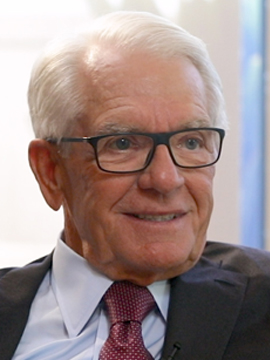Charles Schwab

Graham travels to San Francisco to spend the day with financier and philanthropist Charles Schwab at his company headquarters. The discount-brokerage entrepreneur has a reported net worth of $8 billion, but has struggled his whole life with dyslexia. Plus, he opens up about the impact golf has on his life, being shaped by the Great Depression, and balancing his growing business and family.
Charles Schwab
EPISODES
Golfing with Charles Schwab
Graham and Charles Schwab spend some time at TPC Harding Park. Schwab describes being approached to build the Frank “Sandy” Tatum clubhouse, playing as an amateur in the AT&T Pebble Beach Pro-Am, and the First Tee of San Francisco youth program. Plus, Schwab talks golf with Graham, and gives him a few putting tips.
Charles Schwab: Scariest moment of my life
Financier and entrepreneur Charles Schwab describes walking into the Bank of America boardroom as the youngest member, and biggest shareholder, and breaking with the CEO. Plus, he recalls being disappointed in the handling of his company, and the decision to buy it back.
Charles Schwab: Fighting to get my company back
Financier Charles Schwab describes the fight to regaining his company’s independence from Bank of American following massive losses. Schwab said that retaining the rights to his name and likeness were key to making the process easier. Also, he describes the pain of having to shrink the company just months later, laying off employees due to a steep downturn in the market.
Charles Schwab: My Pollock and Warhol art collection
Financier and philanthropist Charles Schwab draws parallels between the freedom required to make great art, and that required by capitalism. The number one thing is to buy art that is pleasing to you, he says, but the art has also become a great investment. Plus, he describes the great works of art in his personal collection, including Andy Warhol, Jackson Pollock and Gerhard Richter. And, he reminisces about his best art buy: a Francis Bacon that increased in value over 20 times.
Charles Schwab: Driving tractor on a beet farm
Financier Charles Schwab reminisces on going hunting with his father, a small-town attorney, in Mexico and California. Schwab would be paid 50 cents a bird by his father for those he picked. Plus, he describes his first jobs, from picking walnuts as a kid, to making a $1 an hour driving a tractor on a sugar beet farm, to being a night-switchman on the railroad.
Charles Schwab on dyslexia: I struggle with alphabet
Financier Charles Schwab recalls how he struggled in school, especially English class, because of his undiagnosed dyslexia. In college, he could take notes or pay attention, but not both. His son’s diagnosis with similar symptoms helped Schwab realize he too had a learning disability, which he struggles with to this day. Schwab has focused some of his philanthropic endeavours towards those whose lives have suffered due to dyslexia. Plus, he recalls the challenge of giving a speech in front of his high school class.
Charles Schwab: My daughter in a coma
Charles Schwab describes learning his daughter might not survive following being trapped in a smoke-filled room during a fire. Katie Schwab spent six weeks in a medically-induced coma, with only a 50% chance of living.
Charles Schwab: Responsibility of wealth
Financier and philanthropist Charles Schwab devotes much of his philanthropic energy to helping young people with financial literacy. The self-made entrepreneur says that charitable giving is one of the responsibilities of the wealthy.
Charles Schwab: Lessons from the Great Depression
Living through the Great Depression, Charles Schwab’s parents always worried about money. Schwab said their struggles taught him to live within his means, but also to be aspirational. He learned to take risks, and to try to find ways to enjoy life. Plus, he reminisces about how his father taught him to buy stocks.
Charles Schwab: I was not a good dad
Charles Schwab discusses the benefits of operating his fledgling business on the West Coast, from the favorable hours to being a part of the new technology that was unfolding in the area. But, working from 6 a.m. to 10 p.m. did not leave much time to spend with his children, something he is trying to make up for now with his 13 grandchildren.
e had to manage while preparing for his 2018 fight against Rocky Fielding.
Charles Schwab: My ‘Ah-Ha’ moment
Self-made financier Charles Schwab discusses his start in traditional investing, working as a financial analyst for a small firm. He thought that finding great companies that had the technological answers for the future was the key to creating rate. But soon, he saw the brokerage system, based on fees and commissions, made investment inaccessible to the average person. So when the system became deregulated, he jumped at the chance to build his own business, where his employees earned a salary, and a bonus based on good service. But the company’s exponential growth came with its own set of struggles.
Charles Schwab: Golf and finance connection
Financier and philanthropist Charles Schwab discusses how sports influenced him growing up, teaching him lessons about work ethic, leadership, and etiquette. Although he loved all sports as a kid, and played basketball, and tennis, it was golf that Schwab credits with getting him into Stanford. Schwab also reminisces how his grandfather’s love of the Golden Gate Fields racetrack taught him that it is impossible to make a lot of money when you’re betting small. Plus, he explains trying to get into college while struggling with dyslexia, and the dinners he shares with close friend and golf legend Phil Mickelson.
Charles Schwab: I’m never selling this company
Charles Schwab says that after his CEO suggested the sale of the company, he questioned the man’s ability. Ultimately, Schwab fired him, creating more work for himself.
